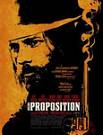|
|
||||
|
|
by Donald Levit  No less than The New York Times dignifies a recent football fiasco as “sibling rivalry of biblical proportions.” Hardly, although, the Vicks aside, fatal competitive brotherly love-hate is primordial, following hard on the heels of Creation and Expulsion and now picked up in Nick Cave's script for John Hillcoat's Oz Western, The Proposition. Not the first collaboration between the U.S./Canada/Europe-raised, Australia-educated feature- and music video-director and the outsider screenwriter- novelist-playwright-actor-composer-singer drawn to “the language of violence,” this movie is largely unpretentious. It is what it is, you get what you get, “an elegy of violence” not only in plot but integrating photography, soundtrack, character, allusion and the very land and climate, as well. If one will read in something about the blood and racism -- “Aboriginal and Torres Straight members are warned [against] images offensive to their peoples” -- inherent in nation-building, well and good. This Down Under descendant of Peckinpah and Leone, is more four-letter-word than they, more technically splatter-graphic, and even more relentless in its realism of stubble, sweat and odor, unwashed bodies and their functions, and insect predators starring plaguey hordes of plain old flies. Frontier life is filthy, cruelty common, death senseless and agonizing in vicious circles. Semi-moral choices are made but as throw-ins incidental to overall, somewhat elegiac designs, so in the end this not a pretty picture in either sense of the word. Those who prefer Meaning, or uplifting or conventional beauty will not find it, nor is there unleavened manna for palates that run to non-unsettling escapist fare. But if you can ignore the mythics or epics sure to get tossed around, here is a movie for those who are willing to take a film for its surfaces, can forgive too many silhouettes against the Land’s sunsets, and want to forget themselves for a while. 1880s Outback outlaws who quote poetry but fail to come across as the intended ambiguously soulful, the stuff of James, Dalton, Younger, Barrow and Barker posthumous legend, the Burns brothers are captained by the oldest, Arthur (Danny Huston), racially tolerant though inconsistently so and family-oriented though mostly his own, for, “monster, an abomination,” he has overseen the rape and slaughter of the white Hopkinses. Second-oldest Charlie (Guy Pearce) and fourteen-year-old Mikey (Richard Wilson) are captured in an otherwise deadly shoot-out, and local officer Captain Morris Stanley (Ray Winstone) presents the former with a proposition: by Christmas, nine days off, bring me the head of Arthur, in exchange for two pardons, but if you falter, hostage Mikey will be hanged. From here on the film back-and-forths between steely-faced Charlie heading to the outlaw’s taboo mountain where not even native “blacks” will venture, only bounty hunters like Jellon Lamb (John Hurt), and English civilization in the quasi-town. Egged on by dandyish, too heavy-handedly named government representative Eden Fletcher (David Wenham), brutish guards and citizens want a lynching, but attention is on Meanwhile, Arthur saves Charlie’s life, not for the first or last time, waxes eloquent about brotherly ties, and organizes the band to rescue the youngest of them. Pearce’s stony demeanor nowhere conveys supposed inner conflict, but a repeat situation forces his hand, while the more sympathetic and interesting Stanley, the only “hero” of any sort, is forced to witness his world turn to wormwood. Is this a Naturalistic comment on cosmic indifference to “justice,” on humankind’s inability to affect Fate, or simply a show of the brutality that coexists with Nature’s bounty? No, no and no; just a Western, entertaining and signifying nothing in strutting and fretting its hour-and-forty-four minutes on the screen. (Released by First Look Pictures and rated “R” for strong, grisly violence and for language.) |
||
|
© 2025 - ReelTalk Movie Reviews Website designed by Dot Pitch Studios, LLC |



